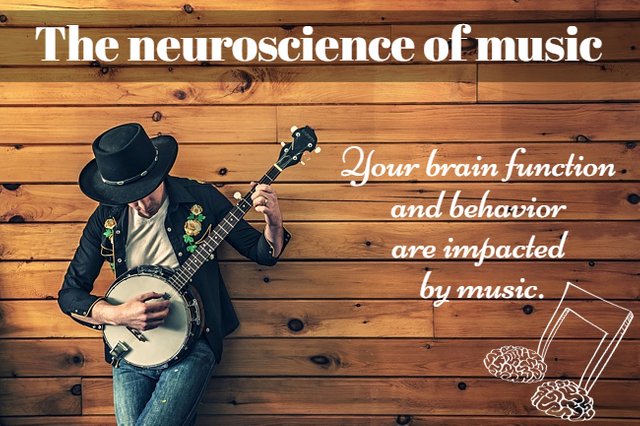The neuroscience of music - your brain function and behavior are impacted
Every post I have ever written here or anywhere else had a musical background while it was in the making. I do not watch much tv but I do listen to music from the moment I open my eyes in the mornings until I closed them and go to sleep at night. It was always interesting to me how classical music was always best for my walks and jazz was reserved for my studying. We all have our favorite artists and it doesn't really matter what you like because research has shown that listening to music can reduce anxiety, blood pressure, pain and improve sleep quality, mood, mental alertness, and memory.

CC0 image, Pixabay, author: RyanMcGuire, adapted by me
Even Friedrich Nietzsche said (*supposedly) that life without music would be a mistake. Music affects different areas of the brain from Corpus Callosum that connects right and left hemisphere, Motor Cortex & Sensory Cortex with tactile feedback from dancing or playing an instrument, Auditory Cortex with perception and analysis of tones, Prefrontal Cortex with the creation of expectation, Hippotalamus with the memory of music, context, and experiences, Visual Cortex with looking at performers and movement, Amygdala with emotional reactions and many more. Ambient noise can impact your creativity and/or focus and by seeing the numbers of videos on youtube for boosting your this or that, I guess more and more people are becoming aware of that.


When it comes to researching the connection between humans and music, I can not skip the amazing work done by BRAMS. In 2005, a neuropsychologist Isabelle Peretzbrain and imaging specialist Robert Zatorre of McGill University in Montreal created the International Laboratory for Brain, Music, and Sound Research (BRAMS), a joint project of UM and McGill. BRAMS received a total of $12 million in a matching grant from government and university sources that helped them explore music's mysteries.
Wireless physiological sensors...
The laboratories that are used in various research include sound booths, a brain imaging lab, an echo-free chamber, and a performance lab with a computerized Bösendorfer piano but the best thing is yet to come. At the concert hall of McGill's Schulich School of Music, researchers will install wireless physiological sensors in up to 25 of the 188 seats to monitor group emotional reactions to live performances. They will monitor heart rate, skin electrical responses, and facial musculature. They are also designing musical instruments that can be played by subjects undergoing magnetic resonance imaging (MRI) brain scans.
It was back in 1985 when Peretz proposed, on theoretical grounds, that the brain had specialized neural pathways for producing and responding to music. Many were skeptical and argued that the neural circuits involved in music mostly overlapped with those used in language and other functions but she proved them all wrong in 1990 with her research on amusia, showing that music and language occupy different brain modules. Her colleague, on the other hand, demonstrated differences in brain activation patterns between musicians who have absolute pitch and those who don't and localized emotional responses to music in the brain. They were both pretty much marginalized until 2000 when the New York Academy of Sciences asked them to organize a conference on the biological foundations of music. After that, they made history and this field began its rise with having different scientists around the world researching music and how it affects the human brain.
Being tone-deaf is a physical condition
Peretz, Zatorre, and their co-workers showed in 2006 with MRI scans that tone-deaf individuals had less white matter in the right frontal inferior gyrus, an area just behind the right side of the forehead.


MIT neuroscientists have identified a neural population in the human auditory cortex that responds selectively to sounds that people typically categorize as music. They are different from speech and other environmental sounds. Using the method of magnetic resonance imaging (fMRI), data researchers identified six neural populations with different functions. There is a music-selective population and a different set of neurons that responds selectively to speech.
"Our findings are hard to reconcile with the idea that music piggybacks entirely on neural machinery that is optimized for other functions, because the neural responses we see are highly specific to music"
-Nancy Kanwisher, the Walter A. Rosenblith Professor of Cognitive Neuroscience at MIT
How are we proccessing music?
The 4 acoustically responsive neural populations overlap with regions of "primary" auditory cortex that performs the first stage of cortical processing of sound. Speech and music-selective neural populations are beyond that primary region. The second stage of processing represents more abstract properties of sound related to speech and music. Future research will show how early does this system develop, does it depend on experiences and does it include subpopulations of neurons that respond to different aspects of music, including rhythm, melody, and beat.
You can read the full research here: Distinct Cortical Pathways for Music and Speech Revealed by Hypothesis-Free Voxel Decomposition by Sam Norman-Haignere, Nancy G. Kanwisher, and Josh H. McDermott


Two UCF professors; neuroscientist Kiminobu Sugaya and world-renowned violinist Ayako Yonetani have been teaching a course "Music and the Brain" at the Burnett Honors College since 2006. This popular course explores how music impacts brain function and human behavior which included reducing stress, pain, and symptoms of depression as well as improving cognitive and motor skills, spatial-temporal learning and neurogenesis (brain’s ability to produce neurons).
Alzheimer’s and Parkinson’s patients
respond positively to music
In the late stages of Alzheimer’s patients are usually unresponsive but when they listen to their favorite music something extraordinary happens. They start moving and singing. The effect lasts for around 10 minutes even when the music is turned off and the MRI scans showed how lots of different parts of the brain light up (Frontal Lobe, Temporal Lobe, Broca’s Area, Wernicke’s Area, Occipital Lobe, Cerebellum, Nucleus Accumbens, Amygdala, Hippocampus, Hypothalamus, Corpus Callosum, Putamen). Most of us heard about the "Mozart effect" and for long was classical music believed to increase brain activity which may not be true for these patients because people with dementia respond better to the music they grew up listening to.
Speaking of Mozart, my 5-month-old nephew seems to absolutely love him and I did notice that more and more people (me included) are using classical music when they want to relax.
This class is very interesting and I am sure that students who are taking it are enjoying everything their professors are teaching. One of those things is how we are all born with more neurons than "we need" and there is a huge neuron dump around age 8 when neurons perceived as unnecessary are removed.
This is one of the reasons why not only teaching music but anything really is important because the more neurons we use as children, the more we will be left with later on. You could say that we become designed for something if we learn it by that age. Did you hear that parents? This is also the reason why there are children out there who know how to read and write when they are only 4 or 5 years old. Just keep in mind that the ONLY PROPER way for children to learn anything is through play. If you make it fun, who knows what you can get your child interested in.
The list of things covered in this class is quite impressive, it deals with music impacting the following things:
- change the ability to perceive time
- tap into primal fear
- reduces seizures
- improves communicating skills
- boost the immune system
- assist in repairing brain damage
- evoke memories
- and many more...


Jonathan Burdette, M.D has researched the music's effects on the brain and came to some interesting findings. With functional magnetic resonance imaging (fMRI), he scanned brains while people were listening to music which they "liked" and "disliked". It included genres of classical, country, rap, rock and Chinese opera and a piece that was their favorite. There was a consistent pattern; preferences had the greatest impact on brain connectivity.
The default mode network circuit...
The type of music people were listening to had less effect on a brain circuit known to be involved in internally focused thought, empathy and self-awareness than their preferences had. The circuit is called default mode network and it was poorly connected when they were listening to the music they disliked, better connected when listening to the music they liked and the most connected when listening to their favorite one. It was also found that the connectivity between auditory brain areas and a region responsible for memory and social emotion consolidation was altered by listening to favorite songs.
Similar emotional and mental states can be experienced by people listening to music that differs in genre. We may have different preferences and the music that I like does not need to be the same as that which you like but our responses to them are the same. You can read the full report on this here:
Network Science and the Effects of Music Preference on Functional Brain Connectivity: From Beethoven to Eminem by R. W. Wilkins, D. A. Hodges, P. J. Laurienti, M. Steen & J. H. Burdette


We are well aware that music can impact our mood. It is something that we are very often exposed to and familiar with. There is music that can provoke such strong emotions that it even makes us cry and do not forget that music was used for centuries to prepare people for battles and get them all fired up. So... It can both stimulate and relax us, it all depends on what kind it is.
The right beat for the right exercise
Listening to music can drown out our brain’s cries of fatigue because it competes for our brain’s attention during low- and moderate-intensity exercise. It not only helps with exercising longer and harder but it also enables us to use our energy more efficiently. There's a ceiling effect on music at around 145 bpm, anything higher than that doesn't seem to add much motivation. If you are wondering what music has what beats per minute, there are complete lists you can find online, from pop and hip-hop that are at 110-140, house at 120-135 and dubstep at around 140. Drum and bass is between 150 and 180 so maybe not the best choice for a jog. This is something definitely worth considering the next time you are creating your playlist to listen to in the gym.
Up until now, there was a lot of research conducted that found how music impacts our endurance, motivation, and even oxygen consumption. Here is just a couple of them for you to check out:
Effect of music-movement synchrony on exercise oxygen consumption. by Bacon CJ, Myers TR, Karageorghis CI.
Psychophysical and ergogenic effects of synchronous music during treadmill walking by Karageorghis CI, Mouzourides DA, Priest DL, Sasso TA, Morrish DJ, Walley CJ.
A different frequency for
a different state of mind
Music has an effect on our mood by entraining the brain to more relaxed states. We can become more focused and attentive and have increased cognitive abilities and sleep more soundly. When it comes to our heart and exercise, we talked about beats per minute but when it comes to our brains, frequency is something that also needs to be considered. Specific frequencies may induce different states in our brain. During the day, while we are active and engaged in normal-life activities, we are in "Beta state" while we are in "Delta" during REM sleep. The more relaxed we are, the smaller the frequency is. Brainwave entrainment is when we are exposed to outside wave frequencies that are contained in the music. This is the reason why you can relax pretty quickly when listening to certain types of music. You may not reach REM sleep but you will calm down more easily. Music has been a popular and beneficial addition to various medical treatments around the world and helps both patients and doctors.


I have yet to master the ability of specification. When I start writing about a certain topic, I often get carried away, I know, but it is only because I get distracted by so much good and interesting information that I want to include. The point of the post is fairly simple, music is good for you. If you have read everything up until now (special kudos to those that opened original articles and research materials), maybe it serves as an additional inspiration to use more music in your everyday life. Eros Ramazzotti is currently blasting through my speakers, how about you? What are you listening to and are you using music to help yourself calm down and exercise better? Are you using it for help with focus and concentration? Leave me a comment, I am interested in your experiences.
If you are interested in learning more about this topic, check out these REFERENCES:
BRAIN, MUSIC, AND SOUND RESEARCH CENTER: Study of Music and the Mind Hits a High Note in Montreal from sciencemag.org
Music in the brain from mit.edu
Your brain on music, popular class breaks down how our brains respond to music from ucf.edu
Music has powerful (and visible) effects on the brain from sciencedaily.com
The Surprising Science Behind What Music Does To Our Brains from fastcompany.com
Music and the Brain:
The Fascinating Ways That Music Affects Your Mood and Mind from consciouslifestylemag.com
Music and the brain: the neuroscience of music and musical appreciation" by Michael Trimble and Dale Hesdorffer
Until next time,
KEEP YOUR SMILE ON
&
ENJOY THE MUSIC


Image sources AND LICENCES in order of appearance:
- all images used in this post are free for commercial use, they are royalty free with the links to original images provided under them
- line divider that I use is from FREE CLIPART LIBRARY, and is here
- title pictures are made by me using the CC0 images from pixabay that can be found here
- my bitmoji avatar was created on https://www.bitmoji.com/, visit the site to create yourown
PROUD MEMBER OF:



@steemitbloggers








Very interesting article and full of really good stuff. Thanks for taking the time to create it @zen-art.
My wife and I were just having a conversation on how some music just transcends all listeners/people. We were listening to "Hotel California" by the Eagles. And my wife said she thought the song was pretty much a song that almost ALL people would think was half way decent.
I do think there are notes and melodies and beats that resonant in a positive way to the vast majority of the human population and their brain wiring.
Whether they be young or old
There are, some songs are will outlive us all. Thank you for sharing your thoughts in such a lovely comment 💚
cool and not intuitive...
Me!
Wow... Imagine fMRI on a population level. That could explain some weird musical preferences on national level (like "turbo folk" :D)
Wow, there is a real reference for this! I could try...
Thank you 4 4 intriguing facts!
This is a good idea to pitch to some institutes in our area, you laugh but I tell you, one day it will be done for sure and I can not wait for it :D
fMRI is such a nice toy, but in 99% used for patients
A few days ago, I read that dogs were tested and they really understand the words, they can probably visualise the meaning when they hear "ball" or "cat". Thank you fMRI
That is not much of a surprise but I am happy that something intuitive as that has some nice background. I once saw a report about a dog who knew more than 100 different words and they were spoken with the same tone and voice, I was amazed.
What would the world be without music? Fascinating article, my dear fairy!
Boring and grey, that is what it would be, boring and grey :D
This post has been voted on by the SteemSTEM curation team and voting trail in collaboration with @utopian-io and @curie.
If you appreciate the work we are doing then consider voting all three projects for witness by selecting stem.witness, utopian-io and curie!
For additional information please join us on the SteemSTEM discord and to get to know the rest of the community!
You know the weekend is going to be good when you see a comment from you on your post :D Thank you lovely people, your support is very much appreciated 💚
Congratulations @zen-art! You have completed the following achievement on the Steem blockchain and have been rewarded with new badge(s) :
Click here to view your Board of Honor
If you no longer want to receive notifications, reply to this comment with the word
STOPDo not miss the last post from @steemitboard:
what interesting findings I have found in your article, certainly life would be a mistake without music, sometimes I think like a musician but I forget about people who only listen to music, and really know that it changes behaviors and even ways of thinking.
Since I was a child my parents raised me listening to jazz and classical music, staying with the first genre and more with Latin jazz which is undoubtedly very abstract in its way of composing.
What worries me about this is that not all music is ingenious or good for the human. there is a world production of junk music that promotes in its content violence, sex and drugs and I refer to reggaeton in particular, although sure of each genre there are also similar ways to compose, the other is that the industry uses a unique frequency for tuning instruments to a frequency of 440hz changing it for the classic 432hz the strangest thing about the case is that the tuning to 440hz was used by the Nazi propaganda ministry and today most of the industry forces this to be the mode of universal tuning Nazi propaganda and today most of the industry forces this to be the mode of universal tuning. There have been studies that show that the tuning of 440hz produces imbalances in the body and even diseases.
a good topic without a doubt, thank you for sharing your research.
Greetings
Nazis used to use all sorts of methods, actually, frequencies for different body organs were used. Every human organ vibrates at a specific frequency and there was a torture method used by many in various wars where a resonating frequency would be used for a destructive interference. Standard of 440 Hz has been the musical note of A above middle C and has been a general tuning standard for musical pitch since 1926, trust me, it has nothing to do with Nazis especially because it came from the USA so you can not blame Joseph Goebbels there.
Junk music is there but it is junk to you (and me), to some, junk is what I listen to. I actually never had a favorite genre, some songs I like, some I do not and they may be from Chopin or Justin Bieber lol it does not matter. Some music is just noise to me and I do not understand it.
Thank you for adding value to this topic with your great comment, it is very much appreciated 💚
Music truly is a powerful tool. I see reality being made up of music and math, which really music is math in action heh. I find it incredibly fascinating that the researchers will be placing the wireless sensors to study the effects of live music on physiology and psychology.
When my great grandmother was passing away, she developed severe Alzheimer’s. The ONLY time she would remember who we were was when we would sing lullabies and children’s songs with her. For a few moments she would recognize us, but then it was gone. It’s wild how much music impacts our lives.
Great post !!!
I had a similar experience with my late grandmother. Music really impacts us in so many ways and it is extraordinary if you think about how each ear has about 18,000 hair cells and the eye has 6 to 7 million cones :D Thank you for your feedback, I am glad you enjoyed the read 💚
Wonderful article, I've been fortunate to have music as a creative channel all my life and will till my dying breath... You attract what you vibrate so VIBE UP with music! Thanks you :)
I tried playing the guitar, harmonica, singing... it was not good :D My curse is I have a perfect pitch but not a body that could create music so I am ok with just listening to others and occasionally banging on my little bongo in the woods where no one can hear :)
Such a well written and complied post covering so many aspects of the magic power that is music, I really enjoyed the read and the links I opened, some am still reading! When I play music at home (practicing and learning new tunes), hours can fly by and it feels like a few minutes. I guess I loose myself in the music. It also feels very therapeutic for my body and soul.
I m finding so many amazing writers on Steemit, so glad I joined. So much to read I will have to get back to writing myself. I’ll check out your other posts too. Blessings
I am glad you are enjoying, living and losing yourself in music. It is very therapeutic 💚
Congratulations! This post has been chosen as one of the daily Whistle Stops for The STEEM Engine!
You can see your post's place along the track here: The Daily Whistle Stops, Issue 308 (11/10/18)
Thank you 💚💚💚